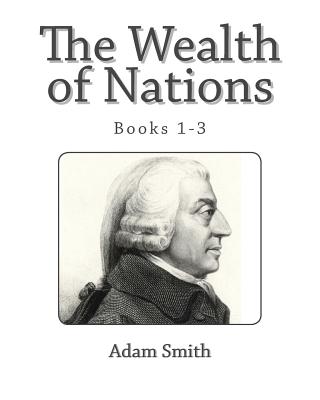The Wealth of Nations (Books 1-3)

The Wealth of Nations (Books 1-3)
The Wealth of Nations is a book that every thinking person should have on their shelf. Though some rough spots in Adam's thinking have emerged over time, his classic book still provides the logic on which capitalism rests its bones. Not until Marx did someone really challenge its dictates --- Smith basically won the argument on most points. But willingness for those with an inability to think critically, to use this book as justification for the domination of the weak by the strong, has little to do with Smith --- it has everything to do with those who are looking for justification of greed. The Wealth of Nations presents the economic underpinnings of capitalism in a concrete way. Filled with ideas, this economic classic is often convincing, sometimes outdated, and frequently fundamental to belief in free-markets. Smith's ideas are combined with appealing (or appalling) examples of the injustice done to people by disturbing the free-market. Essentially, The Wealth of Nations is a treatise on the power of individuals to maximize their own wealth which manages (rather ably) to support the natural liberty of men while arguing for free markets. Smith doesn't argue for free markets as a perfect system in which there will be no misery. Rather, he shows that economic freedom is the system that gives individuals the greatest (and most just) opportunity to gain happiness and which will be the quickest to respond to changes in supply and demand. The Wealth of Nations doesn't support or suggest the "goodness" of goodness of companies and business as a whole, as it is in the interest of companies to create a supply shortage so they can ask prices above cost. Instead, Smith suggests that the free market is the best way to break the price-setting power that otherwise might be wielded. The Wealth of Nations also reveals that political decisions that at fist glance seems compassionate, might in fact be inhumane, cruel and the cause of much suffering (because on the long run they lead to a supply shortage). The examples given here, are still relevant to view the decisions made by politicians in today's so-called free market countries. Books I-III of the Wealth of Nations examines the 'division of labor' as the key to economic growth, by ensuring the interdependence of individuals within society. They also cover the origins of money, the importance of wages, profit, rent and stocks. Smith's work laid the foundations of economic theory in general and 'classical' economic
PRP: 91.06 Lei
Acesta este Prețul Recomandat de Producător. Prețul de vânzare al produsului este afișat mai jos.
72.85Lei
72.85Lei
91.06 LeiLivrare in 2-4 saptamani
Descrierea produsului
The Wealth of Nations is a book that every thinking person should have on their shelf. Though some rough spots in Adam's thinking have emerged over time, his classic book still provides the logic on which capitalism rests its bones. Not until Marx did someone really challenge its dictates --- Smith basically won the argument on most points. But willingness for those with an inability to think critically, to use this book as justification for the domination of the weak by the strong, has little to do with Smith --- it has everything to do with those who are looking for justification of greed. The Wealth of Nations presents the economic underpinnings of capitalism in a concrete way. Filled with ideas, this economic classic is often convincing, sometimes outdated, and frequently fundamental to belief in free-markets. Smith's ideas are combined with appealing (or appalling) examples of the injustice done to people by disturbing the free-market. Essentially, The Wealth of Nations is a treatise on the power of individuals to maximize their own wealth which manages (rather ably) to support the natural liberty of men while arguing for free markets. Smith doesn't argue for free markets as a perfect system in which there will be no misery. Rather, he shows that economic freedom is the system that gives individuals the greatest (and most just) opportunity to gain happiness and which will be the quickest to respond to changes in supply and demand. The Wealth of Nations doesn't support or suggest the "goodness" of goodness of companies and business as a whole, as it is in the interest of companies to create a supply shortage so they can ask prices above cost. Instead, Smith suggests that the free market is the best way to break the price-setting power that otherwise might be wielded. The Wealth of Nations also reveals that political decisions that at fist glance seems compassionate, might in fact be inhumane, cruel and the cause of much suffering (because on the long run they lead to a supply shortage). The examples given here, are still relevant to view the decisions made by politicians in today's so-called free market countries. Books I-III of the Wealth of Nations examines the 'division of labor' as the key to economic growth, by ensuring the interdependence of individuals within society. They also cover the origins of money, the importance of wages, profit, rent and stocks. Smith's work laid the foundations of economic theory in general and 'classical' economic
Detaliile produsului









